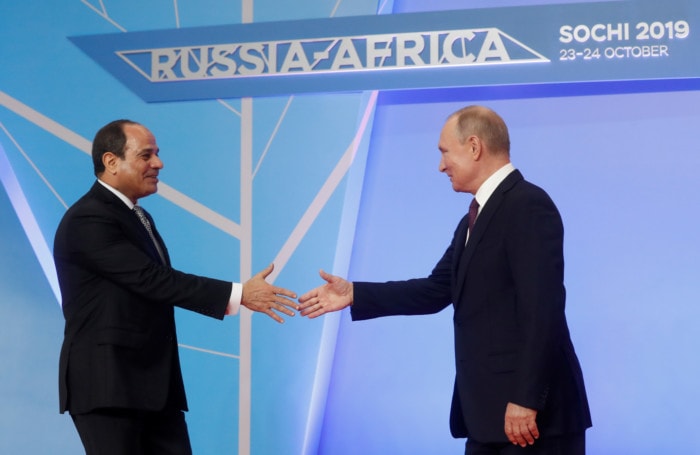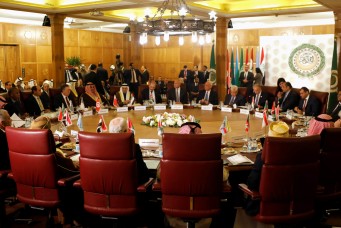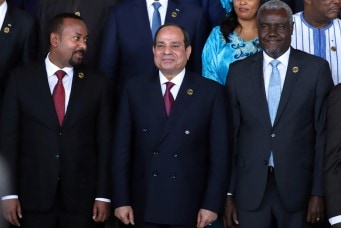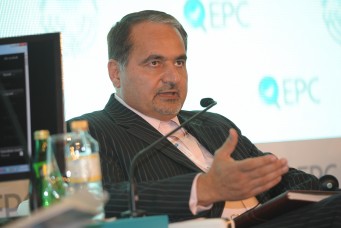Re-Engineering Regional Security
In the last half-century, Egypt has had to negotiate its way through the Arab–Israeli peace process, regional nuclear proliferation, and domestic political transition. What has it taught us?

Egyptian President Abdel Fattah el-Sisi shakes hands with Russian President Vladimir Putin during an official welcome ceremony for heads of states and governments of member-states of Russia-Africa Summit in the Black sea resort of Sochi, Russia, October 23, 2019. Sergei Chirikov/Pool/Reuters.
The last half-century of Middle Eastern politics has been tumultuous. Many states in the region were still inchoate when what seems like an avalanche of existential crises hit. Iraq fought a devastating war with its neighbor Iran; invaded Kuwait; and was itself invaded and occupied by the United States, leading to the end of Baathist rule and the rise of the Islamis State in Iraq and Syria. Syria and Libya are still locked in civil conflict, while the relationship between Israel and Palestine has only grown more tense over the years, with no clear two-state solution in sight.
Nuclear cooperation is tenuous as the United States and Iran have withdrawn from the Joint Comprehensive Plan of Action. Other events, like the Arab Spring, have set the stage for governance and intergovernmental relations in the Middle East today, though their official denouement has passed.
The last fifty years saw the decline of pan-Arabism; the weakening of Arab security cooperation; and with them both, a demotion of Egypt’s standing in the Middle East and Arab World. Though the past five decades seemed marred with trouble, those who ignore history are doomed to repeat it; in fact, studying the missed opportunities of Egyptian diplomacy in the recent past can help chart the trajectory of the future. This was the focus of the webinar hosted by the Middle East Institute at King’s College London and the School of Global Affairs and Public Policy (GAPP) at the American University in Cairo on June 16. If Egypt takes advantage of the lessons taught by its past, it may be able to become a more vocal player in the region and the world.
Egypt’s Global Future
“Egypt has gone into strategic hibernation,” Martin Indyk, former U.S. Ambassador to Israel and special envoy for the Israeli–Palestinian negotiations, said. In the Modern Middle East, there is a vacuum in regional security leadership that “Egypt was designed to fill”; however, it has not yet stepped up to the task, he added.
This vacuum is not new; though Egypt was once a major player in the Middle East, it began to lose its status in the late twentieth century. While Indyk pointed out that Saudia Arabia has attempted to take the reins, he is skeptical of its ability to succeed given Crown Prince Mohammed bin Salman’s repressive tendencies. Instead, Iran and Turkey have seized the opportunity, mirroring the divide between Arab and non-Arab axes that characterizes the modern Middle East. In January, Turkey deployed troops to Libya to intervene in its civil war after signing an economic agreement with the United Nations (UN)-backed government the month before. In November 2019, the BBC reported that Iran “is winning the strategic struggle for influence in the Middle East against its rival, Saudi Arabia”, by strengthening proxy ties that give the Islamic Republic sway in crises in Yemen, Syria, Lebanon, and Iraq.
“The absence of an effective Egyptian pole will be felt” in the region, says Sir Derek Plumbly, Visiting Professor at King’s College London and former British Ambassador to Egypt and Saudi Arabia. He believes that the Egyptian “heft” displayed throughout history “speaks to what might come if Egypt were able to take a more active diplomatic role” once more.
It has many opportunities to do so. Indyk pointed out that the situation between Israel and Palestine today is at a critical juncture. “Israel is about to drive a stake through the heart of the two-state solution” he said, referring to the impending Israeli decision to annex parts of the West Bank. “Egypt could stop it like that,” he added, snapping his fingers.
Historically, Egyptian participation was the sine qua non of peace negotiations. Former Egyptian Foreign Minister and Founding Dean of GAPP Nabil Fahmy agreed, calling on Egypt to be vocal. “It’s important to preempt the crisis rather than to face it,” he assented.
Yet, Washington does not value Egypt’s geopolitical role, Indyk stated. For example, the attempts of the Trump administration to orchestrate the Middle East Strategic Alliance (MESA) fell apart because the United States didn’t fully understand Egypt’s relationship with Iran. “Jared Kushner and Mike Pompeo would have done well to read [Fahmy’s book],” he finished.
Now, Indyk points to a retrenchment of the United States in the region. Though this was started by former President Barack Obama, it has been exacerbated under Trump. The U.S. pivot away from the Middle East was caused by a number of factors: mainly China’s rising geopolitical threat and a decline in oil dependency.
But, for Fahmy, a huge opportunity exists to turn regional leadership into international action. “I can’t compete with the United States in Latin America, but I can in the Middle East,” he said, intimating that Egyptian initiative in the region would compel U.S. action in kind.
“Unless regional players lead, the region will not get better. We will be a compliment to someone else’s interests.”
Indeed, there are many challenges specifically to Egyptian national security that require regional coordination, chief of which are the construction of the Grand Ethiopian Renaissance Dam (GERD), and Turkish involvement in Libya.
Construction of the GERD began in 2011, and has since spurred a conversation about water-sharing rights between Egypt, Ethiopia, and Sudan. For Egypt, which relies on the Nile for 85 percent of its water, continued access to the river is crucial.
“We have no substantial options besides the Nile,” said Fahmy. He identified three necessary levels of decision making: national; tripartite; and independent arbitration, wherein decisions would be binding.
On the Libyan front, its western neighbor is significant to Egypt mainly because of its status as a border state. However, aside from a security vacuum leading to increased terrorist activity on its western border, Fahmy warned that continued conflict in Libya would exacerbate the existing imbalance between Arabs and non-Arabs in the region. “We need to have a tough love conversation, as Arabs, with Turkey, Iran, and Israel,” he prescribed.
Generally, the Egyptian–Turkish relationship has deteriorated since Egypt experienced its revolutions in 2011 and 2013. But, since the beginning of the twenty-first century, Turkey has gradually reoriented itself away from Europe and toward the Middle East in a bid to fill the regional leadership vacuum. Now, as Turkey deepens its incursion into Libya, the countries find themselves on opposite sides of the conflict. While the Egypt–UAE–Saudi Arabia bloc supports the rebel contingent led by General Khalifa Haftar, Turkey backs the UN-supported government that holds control of Tripoli. This Spring, Egypt even launched a naval commando force in collaboration with Libyan fighters loyal to Haftar to block Turkish aid to Tripoli.
According to Fahmy, this regional imbalance can be traced back to the 2003 Iraq War, the U.S. instigation of which Fahmy described as “baseless”. Similarly, the Arab security paradigm itself, which was one strong, crumbled due to the Iraqi invasion of Kuwait in 1990. Both of these events fractured the region and made the Arab states in the Middle East overly dependent on foreign parties for security, setting the stage for modern challenges in cooperation.
Though important, the U.S.–Egyptian relationship has always been uncomfortable. For Fahmy, it’s because the countries are, in many ways, too similar; Egypt sees a form of ‘American exceptionalism’ in itself. Egypt attempts to fulfill regionally the role that America plays internationally.
Egyptian–Russian cooperation was at its peak in the 1960s; but, in October 2018, Egypt and Russia signed a partnership agreement to renew their cooperation. The agreement has two components: economic and military. While it will lessen barriers to bilateral trade, it will also initiate cooperation on counterterrorism, migration, and nuclear programs. The last provision will manifest in joint funding of the construction of al-Dabaa power plant on Egypt’s Mediterranean coast.
“I’ll be very candid with you: what Russia can offer on a day-to-day basis does not compare to what America can offer on a day-to-day basis, despite America’s shrinking role internationally,” Fahmy said.
For Egypt, it’s not about ‘picking sides’: “A country like Egypt doesn’t have the choice of being isolated,” he explained. Decision making cannot be a function of ‘replacing’ the United States with Russia, as is commonly conceived of, or vice-versa. The same logic applies to an Egyptian relationship with China: “The dollars and cents aren’t in the West anymore,” Fahmy explained. “They’re not even in the Middle East—they are much more in Asia.”
Ultimately, Fahmy’s thinking is fully progressive. “Egypt is 70 percent and Africa is 60 percent youth. They don’t want to talk about history; they want to talk about the future,” he said. There’s only one way through crises, and that’s forward: stop dwelling on the past, and start thinking strategically about the future.
A Peaceful Middle East for All?
However, if Egypt is to play a more influential role in any prospective peace negotiations, it needs to draw inspiration from its pivotal position in decades past.
The 1973 War created an incentive for peace between Egypt and Israel; before the war, Egyptian efforts to broker peace were ignored. Additionally, the war forced the United States to see Egypt as a viable negotiating partner. But, the peace process did not continue without fault after the war. The Syrian failure to attend the first Geneva conference was the first mistake. Not only did not going send a negative message, but Syrian attendance would have kept the process under United Nations auspices, which would have ensured that negotiations stay regional and multilateral.
Second, the potential of former Israeli Prime Minister Yitzhak Rabin and then-Foreign Minister Shimon Peres, who together with former Chairman of the Palestinian Liberation Organization Yasser Arafat won a Nobel Peace Prize in 1994 for their role in constructing the Oslo Accords, was never fulfilled. The Rabin–Peres team was instrumental in moving things forward from the Israeli side; but, they had an opportunity to do more, especially with regard to settlements.
Almost a decade later, in 2000, the Camp David Summit hosted by the United States suffered from acute diplomatic mismanagement. Not only was the timing wrong, but communication was faulty; then-U.S. President Clinton asked former Egyptian President Mubarak to persuade Arafat to accept U.S. parameters without describing what they were. But, Fahmy maintains that it was a mistake on Arafat’s part to reject the Clinton parameters. “Not having them ultimately meant that the Bush administration and so on and so forth was not going to be supportive,” he concluded.
The failure of the 2002 Camp David Summit was part of a broader trend; historically, the peace process has been overly dependent on the United States.
“They’re not, they never were, and they never will be an honest broker,” said Fahmy of the U.S. role in peace negotiations. He cited the Obama administration and former Secretary of State John Kerry as an example; then, the disagreement that ultimately stalled peace was between Israel and the United States, not Israel and Palestine. Yet, the Arab Peace Initiative that was first endorsed by the Arab League in 2002 was also lacking. It seemed to be reactive to 9/11 rather than a true drive for peace.
Parallel to the urgency of resolving the Palestine-Israel conflict is setting realistic goals on nuclear proliferation. In this dialogue, the Treaty on the Nonproliferation of Nuclear Weapons (NPT) is pivotal. It could have been made more effective by taking a narrower lens to its objectives; at the 1995 NPT Review and Extension Conference, parties should have chosen to extend the treaty for only twenty-five years rather than indefinitely. In another example, the document’s makers originally sought for unanimous ratification.
Additionally, one of Egypt’s key conditions in joining the NPT was that its regional partners join as well. Yet, to date, Israel is one of four countries not party to the convention, alongside India, Pakistan, and South Sudan. “We’re not going to have security in the region if there’s an imbalance in national security capacity,” Fahmy emphasized.
But, Fahmy emphasized that Egyptian diplomatic decisions were hindered at the turn of the century by domestic turbulence. According to Fahmy, there were essentially three President Mubaraks in power over his thirty-year rule: one each decade. With each decade, the former President’s “willingness to take the icebreaking role” declined. For example, Mubarak was eager to enter Kuwait during the Iraqi invasion in 1990; however, in 2010, it would have been difficult to persuade him to take the same measures. In addition, it was increasingly difficult to persuade Mubarak to assent to any American initiative; it was held that the United States’ relationship with Egypt was superficial, based only on their need in the short-term.
Hassan Elbahtimy, who acts as a lecturer in the War Studies Department at King’s College London and chaired the conversation, echoed this warning against “too much stability” and not enough innovation in policymaking. Could that have helped smooth Egypt’s transitional period after Mubarak was removed from power?
“Everyone says Egypt has been in transition since 2011; no, transition began in 1952,” Fahmy emphasized. Since 1952, Egyptian leaders have struggled to build an Egyptian identity through an inclusive social contract. Nasser, Sadat, and Mubarak all had clearly defined goals; however, they were overwhelmed by domestic issues because of this lack of a social contract. In turn, Egyptian soft power has waned. “We lost soft power when we started to contain people’s thoughts,” Fahmy warned. He explained that, though Egypt was once a cultural icon for others in the Middle East, the region has begun to pivot toward western Europe, the United States, and Asia as a result.
Yet, Fahmy remains very patriotic: “No one else in the Arab World could have survived two revolutions in two years and remained a functioning state, and we did,” he said proudly. His final disclaimer: “I am a strong supporter of 2011. I also think that 2013 was necessary. But 2011 and 2013 were a call for a bigger role in determining our future, and we need more openness to do that.”
Sydney Wise is contributing editor at the Cairo Review of Global Affairs. Her past work has been published at the Boston Consortium for Arab Region Studies. On Twitter: @sydneyywisee
Read More




